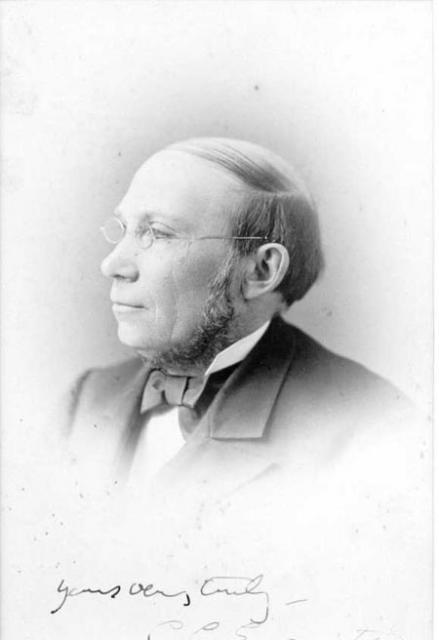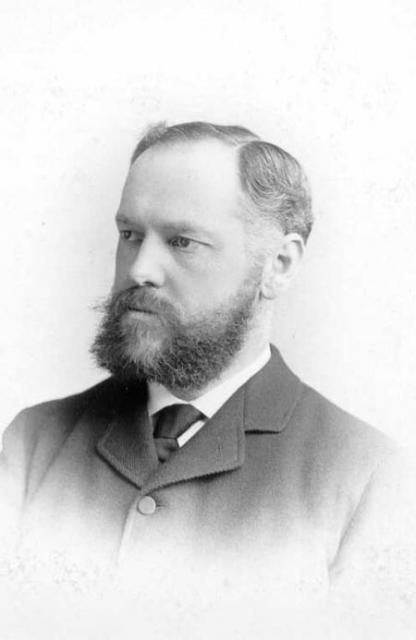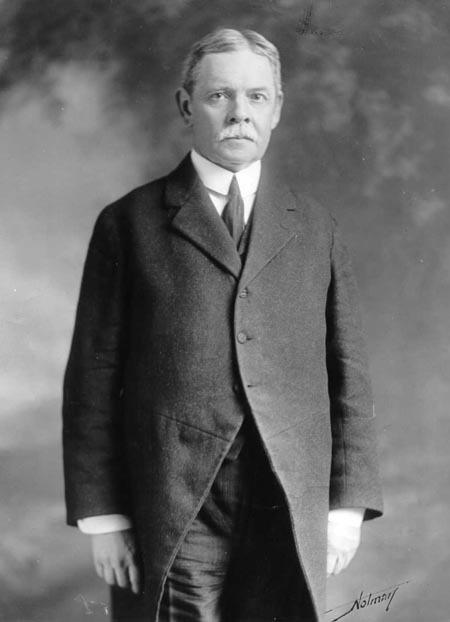The Deans
Charles Carroll Everett
- Bussey Professor of New Testament Criticism and Interpretation, 1869-1900
- Dean of the Faculty of Divinity, 1878-1900
Charles Carroll Everett was born in Brunswick, Maine, on 19 June 1829, the son of Ebenezer Everett, a lawyer and the first cousin of the orator and statesman Edward Everett, and Joanna Bachelder Prince Everett. He graduated from Bowdoin College in 1850. After graduation, he studied at the Bowdoin Medical College and in Berlin under Hegel's successor, Georg Andreas Gabler. From 1853 to 1857 he taught modern languages at Bowdoin (for the last three years he was also Librarian), and his tenure was vetoed by the Overseers because he was a Unitarian. He then entered Harvard Divinity School and graduated in 1859. He served as minister of the Independent Congregational (Unitarian) Church in Bangor, Maine, from 1859 to 1869. In 1869, he published his The Science of Thought, a treatise on the principles of human thought, that attracted the attention of the Harvard Corporation, who that year called him to the Bussey Professorship. As early as 1872, he taught a course in "East Asiatic Religions," perhaps the first course in comparative religions given in the United States. His two regular courses in theology were "The Psychological Elements of Religious Faith" and "Theism and the Christian Faith."
Everett was a neo-Hegelian. "First in the lectures of Professor Gabler," he wrote, "and afterwards in the works of Hegel himself, I found the rudiments of a system of logic that charmed me with its beauty and simplicity." His works show the broad range of his interests: Religions before Christianity (1883), Fichte's Science of Knowledge (1884), Essays on Poetry, Comedy, and Duty (1888), Ethics for Young People (1891), and The Gospel of Paul (1893). A collection of his essays, Essays, Theological and Literary, was published (1901) after his death.
From his youth, he was "of a delicate constitution" and blind in one eye. When during his term as Dean, the Harvard faculty proposed to have each applicant pass a physical examination and give promise of living long enough to justify the investment, he gently noted that such an examination would have ruled him out and that his parents were themselves in doubt whether he was "worth raising." The motion was promptly withdrawn.
Known as a consummate teacher, he was remembered by many students as one of the greatest inspirations in their lives. F. G. Peabody remembered him this way: "It was permitted to a generation of students for the ministry to be guided and restrained by a character so self-effacing as never to be conspicuous, yet so convincing as to communicate both thought and life."
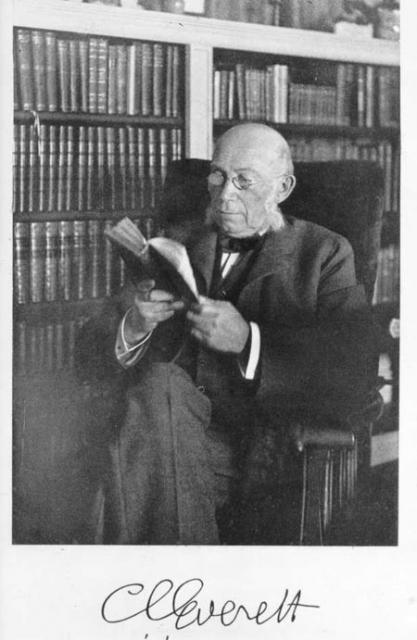
Sources of information:
American National Biography. Edited by John A. Garraty and Mark C. Carnes. New York: Oxford University Press, 1999 Francis G. Peabody, Reminiscences of Present-day Saints. Boston; New York: Houghton Mifflin Company, 1927.
Francis Greenwood Peabody
- Lecturer in Ethics and Homiletics, 1880-81
- Parkman Professor of Theology, 1881-86
- Preacher to the University, 1886-1906
- Plummer Professor of Christian Morals, 1886-1912
- Dean of the Faculty of Divinity, 1901-06
Francis Greenwood Peabody was born in Boston on December 4, 1847, to Mary Jane Derby and Ephraim Peabody, a Unitarian minister. After Ephraim Peabody's untimely death, his former congregation provided the funds for his son's education. The younger Peabody graduated from Harvard College (1869) and received degrees from the Divinity School (1872) and from the Graduate School (1872). Peabody's studies at Harvard were but the beginning of a long relationship.
After a brief time as chaplain and teacher at Antioch College in Ohio, Peabody served as minister at the First Parish in Cambridge (Unitarian). In 1880, Peabody became a lecturer on ethics and homiletics; while at Harvard, he also served as the Parkman Professor of Theology (1881-86), Preacher to the University (1886-1906), Plummer Professor of Christian Morals (1886-1912) and the Dean of the Divinity School (1901-06).
Peabody's work at Harvard was spread over many areas of University life, though his most lasting influence lies in his introduction of social ethics at the Divinity School and, later, through a University Department of Social Ethics. Among students his course was better known as "Peabo's drainage, drunkenness, and divorce." He stressed the need to study the religious and social implications of the changes brought about by the industrialization process. He championed social science methodology and the case method and offered liberal interpretations of the New Testament that reflected a call to ameliorate the dislocation of industrialization. In his teaching, preaching and writing, he portrayed a religious tradition that stressed members as agents of social change, de-emphasizing personal salvation in favor of social action.
Peabody leave a complex legacy when comes to social ethics of race. According to Report of the Presidential Committee on Harvard & the Legacy of Slavery, "When a faculty committee chose W.E.B. Du Bois and his fellow Black student Clement G. Morgan as Commencement speakers, Francis Greenwood Peabody—Plummer Professor of Christian Morals at Harvard Divinity School and preacher to the University—moved to consult the Harvard Corporation as to whether it was appropriate to select two Black students for this honor. Harvard Corporation's answer was no; Du Bois spoke, but Morgan did not." Peabody
Peabody led the successful effort at Harvard to have daily religious service attendance be optional (the first traditional U.S. college to do so) and nonsectarian. Though criticized by some for this effort ("God has become an elective at Harvard," his critics cried), Peabody was a respected preacher, having his university sermons published in five volumes. Peabody also authored many books, including Jesus Christ and the Social Questions (1900) and Jesus Christ and the Christian Character (1905).
He was instrumental in the foundation of Phillips Brooks House at Harvard, the Prospect Union in Cambridge, and the Social Museum at Harvard University
In 1872 Peabody married Cora Weld (1848-1914).
Additional source of information:
American National Biography. Edited by John A. Garraty and Mark C. Carnes. New York: Oxford University Press, 1999.
William Wallace Fenn
- Bussey Professor of Theology, 1901-32
- Dean of the Faculty of Divinity, 1906-22
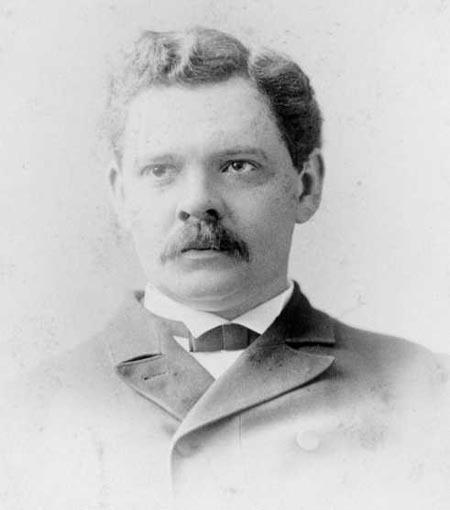
William Wallace Fenn was born in Boston on February 12, 1862, to Hannah Morrill Osgood and William Fenn, who died only seven weeks after his son's birth. Fenn graduated from Harvard in 1884 and received an AM and STB (bachelor of sacred theology) from the Divinity School in 1887. He had entered the Divinity School "not ... with the design of becoming a minister, but rather with a view to the teaching of N. T. Greek."
Raised in an orthodox congregationalist (and known as one while a student at the Divinity School), Fenn had begun to question beliefs as he studied the Bible. He was not, however, sure he wanted to become a Unitarian: "The Orthodox won't have me for I have declared my heresy and the Unitarians don't want my kind of man." Ordained a Unitarian minister in 1890, Fenn served parishes in Pittsfield and Chicago from 1887 to 1901. In Chicago, Fenn began his teaching career at the Meadville Theological School. While teaching at Meadville, Fenn articulated a functional and pragmatic approach to religion; in so doing, he levied criticism against liberal optimism, questioning its ability to deal with human suffering.
In 1901, Fenn was named that Bussey Professor of Systematic Theology at Harvard (although he had no background in the area). From 1906 to 1922 Fenn was the Dean of the Divinity School and received his STD (doctor of sacred theology) from the school in 1908. He also served on the University's Board of Preachers for five years (non-consecutively).
At Harvard, Fenn stressed a "General Theism," which questioned many ideas that later became important in Christian theology: humanism and the centrality of the historical Jesus in liberal strains of Christian thought. Fenn was also known for his keen sense of humor; one of his most popular lecture topics was "The Humor of the Bible." As a teacher he was remembered this way: "He made us feel that together with him, amid the generous bequests of philosophers and theologians we were seeking for the hidden treasure of great souls, -- not so much the knowledge as the wisdom by which men live."
Fenn's other scholarly work centered on religious life in New England, with The Religious History of New England: King's Chapel Lectures (1917), and The Christian Way of Life as Illustrated in the History of Religion in New England (1924).
Additional sources of information:
American National Biography. Edited by John A. Garraty and Mark C. Carnes. New York: Oxford University Press, 1999
William Wallace Fenn: His Journal, Together with Pertinent Letters and News Items. Concord, Mass.: Dorothy Fenn Duncan, 1973.
Robert Burns Street, "Speaking for the Class of 1914," Harvard Divinity Bulletin, v. 28, no. 4 (July 1964), p. 105-106.



